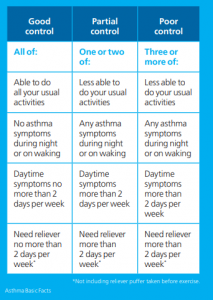FAQ: Should I travel to locations experiencing poor air quality from bushfire smoke?
Bushfire smoke can trigger symptoms for people with respiratory conditions such as asthma. Bushfire smoke contains high concentrations of particulate matter (PM2.5) which can irritate the lining of the airway causing inflammation (swelling) and extra mucus to be produced. PM2.5 is very fine particles which can reach the lungs and enter the blood stream.
This causes the airways to narrow and can result in asthma symptoms such as wheezing, chest tightness and coughing, making it difficult to breath and triggering an asthma flare-up. These flare-ups may become severe very quickly.
If you are pregnant, have very young children, are over 65 or have asthma or pre-existing respiratory or cardiac conditions, your health or that of your child is most at risk to exposure to poor air quality.
Consider the 5-point checklist below to help you make a decision about your travel.
1. Do you have good asthma control or is your asthma flaring up?
- Good asthma control means are you are having symptoms less than twice a week during the day; no night or early morning symptoms and you’re not getting symptoms during normal activities
- If your asthma seems to be flaring up, you will be more at risk of a serious asthma attack. If you are concerned about your asthma control, speak to your doctor before you travel.
2. Do you have an Asthma Action Plan?
- An Asthma Action Plan is a set of instructions, written with you by your doctor, which details what to do in the event of worsening asthma or an asthma attack. These should include information about trigger management, such as exposure to smoke. Visit your doctor to get an Asthma Action Plan or update yours before you travel.
3. Do you have enough medication to manage your asthma or an asthma attack if one occurred?
- Ensure you have enough reliever, preventer and rescue medication (as prescribed) for the duration of your trip. You may need to get extra scripts from your doctor in case.
4. Do you know where a local medical facility is, or afterhours services are in the location you’re travelling to?
- Make sure you know where you can seek help in the event your asthma worsens.
- Know Asthma First Aid. If symptoms are severe and not improving with Asthma First Aid don’t wait – Dial Triple Zero (000); if symptoms are life threatening dial Triple Zero (000) and then commence Asthma First Aid.
5. Do you have cover for emergency ambulance transfer to a hospital, particularly if you’re in a rural area?
- Check your current ambulance cover before you travel. If you are travelling interstate, check with your provider that you are covered for ambulance use in the state or territory you are travelling to.
Follow recommendations from the local fire service with changing conditions.





 1800 278 462
1800 278 462



